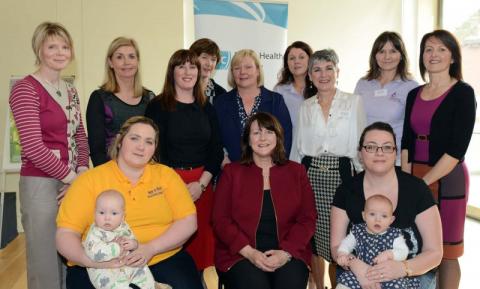Providing support for breastfeeding mums

Providing peer support to mums who want to breastfeed was the focus of a conference held today [15 April] by the Public Health Agency (PHA) in Ballymena.
Breastfeeding peer support is where women who have breastfed their own children are provided with specialised training to enable them to offer appropriate information and support to pregnant women and new mothers on how to breastfeed their babies.
This approach forms part of a range of initiatives to improve support for breastfeeding mothers, and enables people with first-hand experience of breastfeeding to share their knowledge with new mums.
The aim of the seminar was to discuss the successes and challenges associated with sustaining effective breastfeeding peer support programmes and explore the way forward for peer support in Northern Ireland.
Janet Calvert, the PHA’s Regional Breastfeeding Lead, explained: “The importance of breastfeeding to the health of mothers and their babies is well recognised. Health benefits for children can include reduced risk of infections, childhood obesity, diabetes and sudden infant death. It is also a really satisfying feeling to be able to feed your own baby.
“Mothers who breastfeed may also benefit from reduced risk of breast cancer, ovarian cancer and osteoporosis.
“Despite this, Northern Ireland has the lowest breastfeeding rate in the UK. A recent survey suggests that many women give up breastfeeding in the early weeks and this may be because they are experiencing some difficulties and are worried that their milk supply is low.
“There is a clear need to ensure that mothers have access to breastfeeding information and support and this is where voluntary breastfeeding peer support can make a real difference. This event has provided an opportunity for people to share their experiences and explore how we can further improve this important support system for expectant and new mothers.”
Participants at today’s seminar included breastfeeding co-ordinators, midwives, health visitors, health improvement staff, representatives from Sure Start, voluntary breastfeeding counsellors and peer support mothers.
Speakers included representatives from the PHA, health and social care trusts from across Northern Ireland, Action for Children and GOLD Surestart.
Further information on breastfeeding is available at www.breastfedbabies.org. The site also has details on the ‘Breastfeeding welcome here’ scheme, which is an initiative which aims to make it easier for mums to find places where they can breastfeed their baby when they are out and about.
- Breastfeeding peer support recommended as part of a multi- faceted approach aiming to improve breastfeeding outcomes (Dyson 2008)
- NICE PH 11 public health guidance on improving nutrition of pregnant and breastfeeding mothers and children in low income households suggests that peer support programmes should ensure that peer supporters are part of a multi- disciplinary team (NICE 2008)
- The proposed new strategy ‘ A Ten Year Breastfeeding Strategy for Northern Ireland 2012-2022 (DHSSPS 2012) recognises the need for peer and professional involvement in programmes aiming to improve breastfeeding outcomes.
